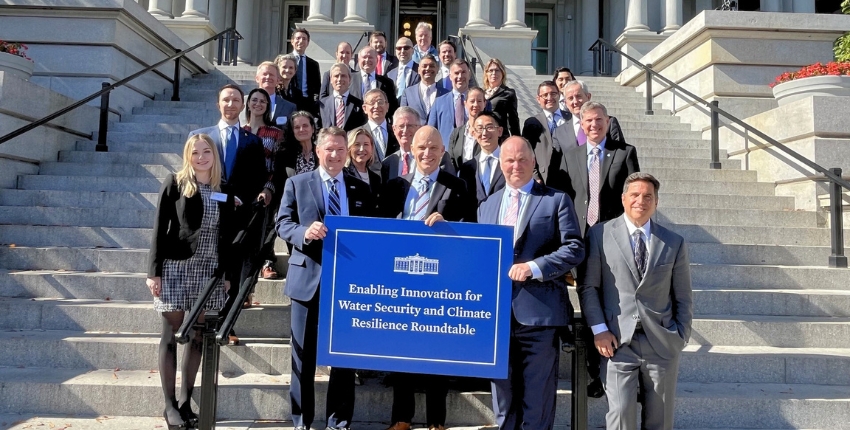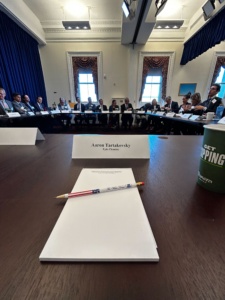Water gets a seat at the table: Insights from the White House water security and climate resilience roundtable


My reflections on the transformative gathering that put a needed spotlight on water
By Aaron Tartakovsky
Co-Founder and CEO of Epic Cleantec
I’m incredibly honored and energized after attending the Water Security and Climate Resilience Roundtable at the White House last week. My hope is that the commitment to water security and climate resilience endures across administrations, transcending political cycles.
Being among a select group of industry leaders—with Epic Cleantec as one of only two startups in attendance—was a testament to the growing role of innovation in reshaping our water and climate strategies. Epic Cleantec has been at the forefront of advancing water reuse adoption in commercial real estate, and our presence reinforced the critical role of water reuse in addressing climate resilience.
Several key insights emerged from the roundtable, highlighting the transformative potential of strategic water management in addressing climate issues:

Water: A cornerstone of climate action, resilience, and adaptation
A key takeaway from the meeting was that water is essential to every facet of climate action. From preparing for extreme weather events to reducing energy consumption and managing scarce resources, water must remain central to our climate strategies. However, unlike the energy sector, which has a clear target in the 1.5°C global temperature limit, water lacks a unifying objective. As Jim Andrews of PepsiCo once put it, “water needs its own bumper sticker”—a concise rallying point that can help unite stakeholders around water’s role in the climate crisis.
Smart, connected infrastructure for a sustainable future
Modernizing our aging water infrastructure emerged as one of the most pressing needs. Replacing outdated infrastructure with “smart” systems, which allow for real-time monitoring and optimization, is essential to building resilience. At Epic Cleantec, we’ve embraced this approach with our advanced SCADA systems, which provide real-time insights and remote control, moving beyond the “out of sight, out of mind” status quo. This perspective, echoed across the roundtable, is a necessary step toward future-proofing our infrastructure.
Recognizing the water-energy nexus
The water-energy nexus was another central theme. Efficient water management can yield significant energy savings, and the reverse is also true. For instance, water-intensive industries like data centers drive up energy demand, but smarter water management can help alleviate this burden. The roundtable highlighted the potential for water systems to be energy generators—through wastewater heat recovery and water-powered microgrids—showcasing opportunities to leverage water within the energy landscape.
Incentivizing private sector action
There was broad agreement on the need for stronger incentives to drive private sector action on water resilience. Government leadership is crucial, but private innovation and investment are essential to scale solutions. Beyond tax credits and subsidies, attendees discussed creating a catalytic agency, modeled after the DOE Loan Program, to de-risk investment in emerging water technologies. Encouraging private responsibility not only accelerates progress but also fosters a more collaborative approach to addressing our water challenges.
Agriculture as a vital part of the solution
Urban water use often takes center stage, but agriculture remains one of the largest consumers and must be part of any water security strategy. Agriculture supports food systems, rural economies, and national security. Finding sustainable solutions— including through improved irrigation and water recycling—will be essential to a comprehensive approach. The roundtable emphasized a balanced approach to address both urban and agricultural needs within our climate and water goals.
The aging workforce and the need to attract young talent to the water sector
The aging workforce in water and the need to attract young talent is another key focus issue. Many experienced professionals are nearing retirement, creating a skills gap that could slow progress. Younger engineers, passionate about climate action, may overlook water due to its lack of visibility compared to other environmental fields. By better communicating water’s impact and showcasing it as a critical climate solution, we can inspire a new generation to view water as a meaningful and dynamic career path.
A transformative moment for water and climate innovation
The roundtable reinforced that water, historically overshadowed in climate conversations, is now stepping into the spotlight. Epic Cleantec remains committed to advocating for water security as a pillar of climate resilience, economic stability, and industrial growth. Reflecting on our journey, it’s surreal to think that only a few years ago, Epic Cleantec was a small garage startup with humble beginnings. Now, to be seated at the White House, discussing water resilience with industry leaders, is a powerful reminder of how far we’ve come—and how essential our mission has become.
We are proud to be part of a movement placing water at the center of climate solutions, ensuring water is not only sustainable but, as we like to say, even a little bit “sexy.” We look forward to advancing solutions that bridge political divides, focusing on a shared vision of a resilient and sustainable future.

